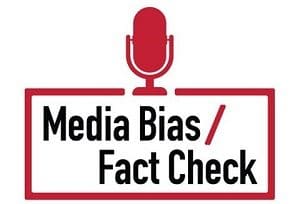QUESTIONABLE SOURCE
A questionable source exhibits one or more of the following: extreme bias, consistent promotion of propaganda/conspiracies, poor or no sourcing to credible information, a complete lack of transparency, and/or is fake news. Fake News is the deliberate attempt to publish hoaxes and/or disinformation for the purpose of profit or influence (Learn More). Sources listed in the Questionable Category may be untrustworthy and should be fact-checked per article. Please note sources on this list are not considered fake news unless specifically written in the reasoning section for that source. See all Questionable sources.
- Overall, we rate Caixin Global Questionable based on the promotion of pro-government propaganda and significant censorship that omits criticism of the government.
Detailed Report
Reasoning: Censorship, Propaganda
Bias Rating: RIGHT-CENTER
Factual Reporting: MIXED
Country: China
Press Freedom Rank: TOTAL OPPRESSION
Media Type: Magazine
Traffic/Popularity: Medium Traffic
MBFC Credibility Rating: LOW CREDIBILITY
History
Launched in 2009 by Hu Shuli, The Beijing-based Caixin Global provides business and financial news about China. In 2009, Hu Shuli resigned from a financial news magazine called Caijing magazine, also founded by her. In 2010, she established Caixin Media Company Limited, followed by an English-language news site called “Caixin Online.”
According to its about page, Caixin Media Company Limited provides “financial and business news through periodicals, online content, mobile apps, conferences, books, and TV/video programs” through “integrated multimedia platforms.” Caixin Online grew into Claxin Global, which provides “intelligence and consultancy services, bespoke research, and a conference and network platform.” In 2013, according to a Variety article, “Li Ruigang’s CMC Buys Stake in Caixin Media.”
In 2019, Reuters described Caixin as “backed by tech giant Tencent Holdings Ltd and investment firm China Media Capital (CMC).” China Media Capital is owned by Li Ruigang, who is also the Chairman. The current Editor-in-Chief is Wang Shuo, though Shuli still serves as the publisher.
View our report on the Chinese government and media.
Funded by / Ownership
Hu Shuli publishes Caixin Global. China Media Capital (CMC) holds large stakes in Caixin, as Reuters and Hollywood Reporter reported. The U.S. Securities and Exchange Commission (SEC) report indicates that “CMC Capital’s prominent founding partners include China Development Bank (CDB), one of China’s largest financial institutions.” Known as China’s Rupert Murdoch, Li Ruigang is also a member of the Communist Party of China. In 2018, Hu Shuli stepped down from the editor position. Revenue is derived through a paywall subscription model.
Analysis / Bias
Reporters Without Borders states, “President Xi Jinping has successfully imposed a social model in China based on control of news and information and online surveillance of its citizens. At the same time, he has been trying to export this oppressive model by promoting a “new world media order” under China’s influence.” According to their 2022 report, China ranks 177 out of 180, equating to almost zero press freedom.
In review, most articles pertaining to the Communist Government are favorable to President Xi Jinping. In other words, the content you find on the website is generally factual and neutral in tone. Still, the consistent bias by omission makes Caixin Global a factually Mixed propaganda source. For example, “Xi Jinping Calls for Unity Between China, the U.S. in Pandemic Fight” and “Xi Jinping Says ‘No One Will Emerge as a Winner’ in a Trade War.” An example is a business-related news article, “ByteDance Seeks New Investment Opportunities Amid Global TikTok Pushbacks.” Further, when sourcing, they typically utilize the factually mixed Chinese state-run press agency Xinhua News Agency and weixin.qq.com/ “WeChat,” a Chinese messaging app that the Government heavily censors. Caixin also utilizes credible western news sources such as centerforhealthsecurity.org and CNBC.
Caixin Global, the English language arm of Caixin Media, also has a content-sharing partnership with The Straits Times and The Australian Financial Review, both rated as right-center biased by Media Bias Fact check. In addition, the Wall Street Journal, along with CNBC, and Market Watch, is among their media partners. When reporting news pertaining to the USA, Caixin Global utilizes emotionally loaded words in their articles with a negative tone toward the Trump administration “In-Depth: How the U.S. Missed Its Window for Taming the Covid-19 Virus.” In general, the news is reported factually; however, it is misleading due to strong censorship of anything negative toward China.
Failed Fact Checks
- None in the Last 5 years
Overall, we rate Caixin Global Questionable based on the promotion of pro-government propaganda and significant censorship that omits criticism of the government. (M. Huitsing 7/27/2020) Updated (06/19/2022)
Source: https://www.caixinglobal.com/
Last Updated on May 17, 2023 by Media Bias Fact Check
Do you appreciate our work? Please consider one of the following ways to sustain us.
or
Left vs. Right Bias: How we rate the bias of media sources


